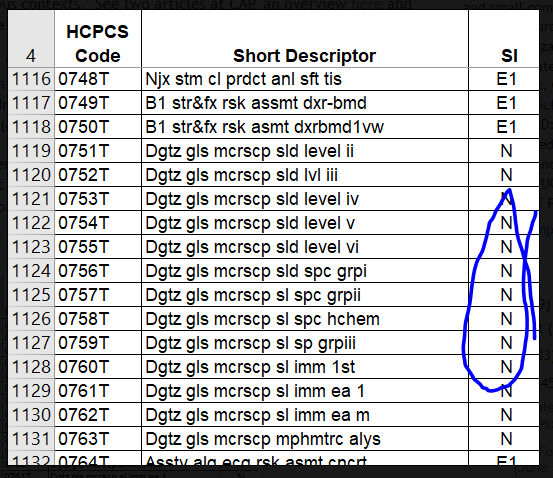Header: Novitas has published guidelines on the new AMA Category III codes for digitizing medical slides, stipulating special situations where they may be payable. But I see a few policy bugs in the water.
For subscribers to Genomeweb, see a deep-dive article by Greg Cima on the same topic (including private payers and lab consultant interviews), August 29, 2023, here.
###
Last January, AMA CPT brought out about a dozen Category III codes, unpriced, for digitizing slides for medical purposes (not teaching or team conferences). And there's more. For January 2024, AMA has announced a few dozen more. They are add-on codes that will eventually pair to nearly any code that generates a glass slide.
CMS has put the codes on "bundled/not separately paid" status for the OPPS setting. Ouch! See my article about the nonpayment edits here. (To my surprise, there wasn't even a short paragraph on this topic for these new codes in the July 2023 OPPS proposed rule.)
Novitas Article
Novitas publishes the first article about the codes. It says that they are potentially payable IF REASONABLE AND NECESSARY. They describe this pretty narrowly, giving the example of a glass slide that is unique and risky to mail, so it needs to be digitized and sent as whole slide imaging. Another example is an emergency where sending the slide digitally is faster than Fed Ex.
Find the article here, and I'll clip it at the bottom of this blog as well.
https://www.novitas-solutions.com/webcenter/portal/MedicareJL/pagebyid?contentId=00278110
Two Dilemmas for BQ
I see two "nerd dilemmas."
One, while I'm an advocate of digital pathology, from a neutral view, it's not entirely clear why, if CMS would not pay $30 for Fed Ex, CMS would potentially pay $30 (or some other fee) for WSI. One way out of this corner, is to point out that Fed Ex is not an FDA-approved device, whereas a WSI scanner is.
The other dilemma is that both clin chem and pathology have CMS dates of service rules that fix the DOS for 14 or 30 days as the date of specimen collection. If that's in a hospital (inpatient or outpatient) the bundling rule against these codes may apply. For example, with a hospital outpatient office visit, routine clin lab tests (but not genetics) are bundled, and they're bundled whether or not the clin chem is done at the hospital or off site. By analogy, I think the OPPS no-pay bundle rule for the Cat III codes might apply even if the slide is coming from elsewhere as long as the date of service rule ties it to an inpatient or outpatient event. Novitas' text doesn't dwell on this. It focuses on a Pt B 1500 claim, not a hospital 1450 claim, but the bundle rules are established by specimen origin location and timing, not by the choice of claim form (wouldn't that be nice). Avoiding the OPPS non payment policy, the Novitas article would be a good fit (for example) for an private office-based skin biopsy processed in a Part B lab.
Actually, a bonus, third dilemma, is that these are styled as "add on codes," so they have to be on the same claim form on same day of service as the parent code (e.g. 88305). That limits the usefulness, even under Novitas' own rules, when the special consult might come up a couple weeks after the 88305 event.
NOVITAS - June 29, 2023
Billing for digitization of glass microscope slides, CPT codes 0751T-0763T
Digital pathology is a practice in which glass microscope slides are digitally scanned by clinical staff. The digitized images are saved to a computer or cloud-based system, where they can further be viewed, analyzed, and shared with other providers. Providers can remotely access digitized pathological images and data for review and diagnostics. Digital pathology can enhance diagnostic efficiency, prognosis, and prediction of illness. These codes are used to report additional staff work and resource needs associated with the process of scanning and digitizing pathology content.
Effective for claims received on or after August 5, 2023
Providers shall provide a statement on Item 19 of the CMS-1500 claim form, or the electronic equivalent, to document how the digitization of glass microscope slides is medically reasonable and necessary. An example of a potentially reasonable and necessary service includes if a slide requires an outside consultation that would normally require mailing of the slide, digitization could potentially be medically reasonable and necessary if either the slide represents the only slide demonstrating the pathology of interest (and loss of the slide would mean loss of irreplaceable material) or the consultation is required urgently and mailing a slide would take too much time and the delay would put the patient's health at risk.
Failure to prove a statement on Item 19 of the CMS-1500 claim to document the need for the digitization of glass microscope slides may result in claims rejected as unprocessable.
##
Some MACs publish pricing for codes not priced by CMS. I spotchecked this at Novitas and the Dig Path code I looked up was still $0, at least today.
